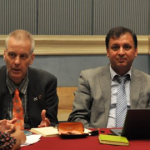Gender neutral language still a far cry in Nepal technical schools
Communication plays a vital role in modern workplaces and language is one of the tools for the communication. However, gender bias in communications still exists in the workplace and that hinders the process of accepting women as equal participants.
A recent research article published in the Journal of Training and Development on NepJOL, supported by INASP, found that female instructors of technical and vocational schools were unaware of gender-neutral language.
In recent years, many institutions have introduced gender-friendly policies in Nepal. One of the requirements of a gender-friendly policy is to address women with respect and not to use discriminatory terms against them. Likewise, another requirement is to avoid using feminine forms of occupations. Such as, addressing the chief of a school as ‘headmistress’ would be considered gender-biased according to the new policy. Many institutions have developed a list of titles that could be used to address both the male and female in a certain profession.
While many people in Nepal are aware that new gender policies have been introduced to ensure gender-neutral language in workplaces, they are not aware of the specific gender-neutral terms to use. Hence, gender-biased terms continue to be used in the workplaces.
Nepali is a partially gendered language. For example, it has different words to address a male student and a female student or a male teacher and a female teacher. Traditionally, this was not a problem because men and women carried out different functions. A gender-neutral term was not required to describe an occupation because a particular occupation would be assigned to either only males or only females.
However, in the recent decades more and more women are entering professions traditionally considered to be the men’s jobs such as doctors, teachers, engineers, lawyers and judges. Hence, a new gender policy has been introduced to ensure that the women in these professions don’t feel discriminated against due to the language used. However, the content of the new policy hasn’t been widely disseminated, and as a result, the use of gender-biased language continues in many workplaces.
Research conducted by Nepal’s Training Institute for Technical Institution found that masculine and feminine words, instead of gender neutral words, were popular and familiar in TEVT schools. Such practice has led to discouragement and frustration, and slowed down the work efficiency of female staff, according to the research.
“The female instructors felt less included, and evaluated the work environment less positively,” said Basanti Roshan Pradhan Shrestha, author of the research article and chief of the Research and Development Department at the Training Institute for Technical Instruction.
Ms Shrestha added: “Officially, discrimination against women is not allowed. However, discrimination continues in practice. Male colleagues still show dominating behaviour and use gender-biased language at workplaces.”
The study also found that women’s views and opinions were not being taken seriously and that they were given stereotypically inclined tasks despite their qualifications.
The research was carried out by conducting in-depth interviews with eight female instructors from different vocational and technical schools in Nepal. The article recommends the development of policies and awareness programmes to increase social communication activities within schools, decrease gender-biased language and increase language similarities between males and females.
The article “Understanding Gender Neutral Language at Workplace: Study of TEVT Schools of Nepal”, appears on the latest issue (Vol. 2, 2016) of the Journal of Training and Development, pages 19 – 24. The article is made available online via Nepal Journals Online (NepJOL) platform, which is part of the JOL Project supported by INASP.
About the Journal
The Journal of Training and Development (JTD) is an annual peer-reviewed international print and online English language journal published by the Research and Development Department, Training Institute for Technical Instruction, Nepal.
About NepJOL
NepJOL hosts over 110 journals published from Nepal, covering the full range of academic disciplines. The objective of NepJOL is to give greater visibility to participating journals and to the research they convey. NepJOL was initiated in June 2006 and officially launched in September 2007. It is a project supported by the International Network for the Availability of Scientific Publications (INASP) and locally managed by Tribhuvan University Central Library. It aims to promote the awareness and use of Nepal-published journals in all disciplines by providing access to tables of contents (TOCs), abstracts and full text on the Internet.
About INASP
INASP is an international development charity working with a global network of partners to improve production, sharing and use of research information and knowledge, so that countries are equipped to solve their development challenges. In particular, INASP works to strengthen the availability, access and use of international research information by researchers in developing countries and the production, quality, dissemination and access of research outputs from researchers in those same countries.
Disclaimer: Research published in journals hosted on the NepJOL platform is selected by the journals in accordance with their own editorial processes and criteria. INASP and Tribhuvan University Central Library provide hosting and guidance on good practices but are not involved in selection of research.
For Further Information
Thakur Amgai, Communications Consultant, INASP
email tamgai@inasp.info
Dr Sangita Shrestha, Communications Officer, INASP
email sshrestha@inasp.info

 Previous Post
Previous Post Next Post
Next Post


